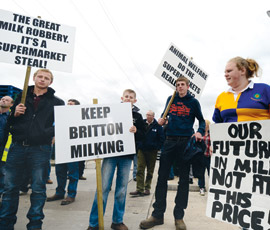OPINION: Voluntary code of practice – one year on

The Dairy Industry Code of Best Practice for Contractual Relations – or the voluntary code, to use its nickname – has been in operation for almost one year. So what is it and what has it achieved?
The code was created as a result of the NFU’s long-term lobbying work to improve unfair milk supply contracts and European Commission proposals to legislate for better contracts throughout Europe. Today, we have a voluntary code rather than a compulsory regulatory solution to the problem of unbalanced and unfair milk contracts.
The code is about balancing the relationship between a farmer and his milk buyer. It’s about making the market function more fairly and it’s about empowering farmers in negotiations.
When I explain to people outside the industry that typically a dairy farmer’s milk contract commits him to supply all his milk to a given specification, typically with a twelve-month notice period and the buyer has the discretion to change the price and other contractual terms at will, without the option for contractual release, I am met with shock. “You mean the supplier has no certainty of his contractual terms, yet he is committed to supply?” they ask. Yes, I say, but we are doing what we can to correct this.
The core issue is setting milk prices. Most buyers have been keen to retain the discretion to set the milk price. This allows them to “de-risk” their businesses and protect their margins. While the NFU opposes buyer discretion in principle, the code seeks to balance it with a producer’s right to terminate.
So in the event of a change to the contract, the price or the pricing mechanism, a farmer can leave after three months. The quid-pro-quo is that if a milk buyer will commit to a price or pricing mechanism, it is reasonable for a farmer to commit to a full contractual notice period.
Today, sign-up to the code is in excess of 85-90% of milk volume in the UK in various guises.
Some of the sign-up is made up of milk supplied by co-ops – which are committed to protecting members’ interests. Some is under supply to a company where the milk buyer commits to pay a milk price in accordance with a formula or mechanism – for example, retail-aligned pools and new formula contracts. Then some sign-up is from private buyers that have retained discretion to set the milk price, but balance this with the right to early termination.
Nobody can deny that today, the best milk prices in the market are those calculated in accordance with a formula or determinable mechanism. Since the implementation of the code, about two billion litres of milk is now priced in this way.
Whether as a consequence of a formula, farmer control or a three-month right to terminate, better balanced contracts are right for the future of the dairy industry.
Only with confidence in a fair and functioning market can farmers be expected to make the necessary investment for the industry’s exciting future.
More online
Keep up to date with all the latest on the milk price protests
